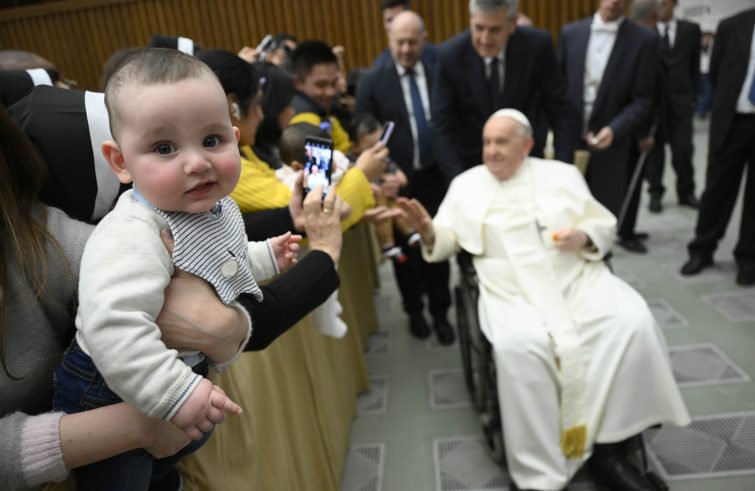
“Let us never forget the martyred Ukraine, Palestine and Israel, which are suffering so much”. With this renewed appeal for peace, Pope Francis concluded the Wednesday General Audience in Paul VI Hall, which was dedicated to acedia, a “dangerous vice” that “closely recalls the evil of depression, both from a psychological and a philosophical point of view.”
“Let us pray for our brothers and sisters who continue to suffer from the war”,
Addressing the Italian-speaking pilgrims, Francis said: “Today is the beginning of Lent, let us advance in this process of conversion and interior renewal by listening to the Word of God, by caring for our brothers and sisters who need our help and by intensifying our prayer, especially to obtain the gift of peace in the world.” At the end of the audience, the Pope extended a special greeting and embrace to Cardinal Ernesto Simoni, “a living martyr who, at the age of 95, continues his untiring commitment for the Church without being discouraged”
“For those who are gripped by acedia, life loses its significance, prayer becomes boring, and every battle seems meaningless”,
the Pope explained: “If in youth we nurtured passions, now they seem illogical, dreams that did not make us happy. So, we let ourselves go, and distraction, thoughtlessness, seem to be the only ways out: one would like to be numb, to have a completely empty mind… It is a little like dying in advance, and it is ugly!”. Among all the capital sins acedia “is often overlooked, perhaps because of its name, which is often incomprehensible to many”, Francis remarked: “Therefore, in the list of vices, the term acedia is often substituted by another, much more commonly used: sloth, or laziness. In reality, laziness is an effect more than a cause. When a person is idle, indolent, apathetic, we say he is lazy. But as the wisdom of the ancient desert fathers teaches us, often the root of this laziness is acedia, which from its Greek origin literally means a “lack of care.” “It is a very dangerous temptation, which one must not joke about”, the Pope remarked: “It is as though those who fall victim to it are crushed by a desire for death: they feel disgust at everything; the relationship with God becomes boring to them; and even the holiest acts, those that in the past warmed their hearts, now appear entirely useless to them. A person begins to regret the passing of time, and the youth that is irretrievably behind them.”
One “most important” remedy against acedia is “the patience of faith”:
“Although in the clutches of acedia, man’s desire is to be “elsewhere”, to escape from reality, one must instead have the courage to remain and to welcome God’s presence in the ‘here and now’, in the situation as it is”, the Pope’s proposal: “The monks say that for them the cell is the best teacher of life, because it is the place that concretely and daily speaks to you of your love story with the Lord. The demon of acedia wants precisely to destroy this simple joy of the here and now, this grateful wonder of reality; it wants to make you believe that it is all in vain, that nothing has meaning, that it is not worth taking care of anything or anyone.” “In life we meet slothful people”, Francis added off-text: “people about whom we say, ‘He is boring!’, and we do not like to be with them; people who even have an attitude of boredom that is infectious. This is acedia.” “How many people, in the grip of acedia, stirred by a faceless restlessness, have stupidly abandoned the good life they had embarked upon!”, Francis denounced at the end of the catechesis:
“The battle of acedia is a decisive one, that must be won at all costs.”
The Pope reminded the faithful: “it is a battle that did not spare even the saints, because in many of their diaries there are some pages that confide terrible moments, of genuine nights of the faith, when everything appears dark. These saints teach us to get through the night in patience, accepting the poverty of faith. They recommended, under the oppression of sloth, to maintain a smaller measure of commitment, to set goals more within reach, but at the same time to endure and persevere by leaning on Jesus, who never abandons us in temptation.” “Faith, tormented by the test of acedia, does not lose its value”, the Pope assured: “On the contrary, it is the true faith, the very human faith, which despite everything, despite the darkness that blinds it, still humbly believes.” “It is that faith that remains in the heart, like embers beneath the ashes”, Francis concluded in unscripted remarks: “It always remains. And if one of us falls prey to this vice, or to the temptation of acedia, try to look within and fan the embers of faith; that is how we keep going.”










